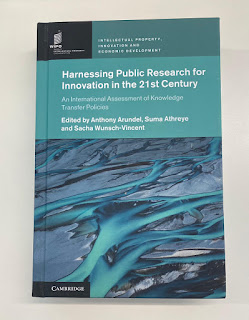Previous Guest Kat Rosie Burbidge, Intellectual Property Partner at Gunnercooke LLP and author of European Fashion Law, returns with a review of Harnessing Public Research for Innovation in the 21st Century An International Assessment of Knowledge Transfer Policies, edited by Anthony Arundel (UNU-MERIT, Maastricht University and University of Tasmania), Suma Athreye (Essex Business School, Southend Campus), and Sacha Wunsch-Vincent (World Intellectual Property Organization). Here is what Rosie has to say about the book:
It is a pleasure to review Harnessing Public Research for Innovation in the 21st Century, edited by Anthony Arundel, UNU-MERIT, Maastricht University and University of Tasmania, Suma Athreye, Essex Business School, London and Sacha Wunsch-Vincent, World Intellectual Property Organization.
Public research and the important issue of how to foster “innovation” are popular concerns for governments and industry alike. This book enables a holistic overview of different innovation practices. By comparing different issues and strategies on an international basis, the common trends and best practices can be more readily identified and questions such as which subsidies produce the greatest economic value can be considered.
 |
The book is split into three sections. The first is an overview of some of the key issues to set the framework for discussion. These range from the evolving role of public R&D to measuring global patenting. The next section considers these issues in more detail in the context of the UK, Germany, Republic of Korea, Brazil, China and South Africa. The final section considers the way forward. This is where the practical considerations regarding the policies and practices for supporting successful knowledge transfer policies are set out into detail including some metrics for measuring success.
Why look at this issue in such detail? As Athreye & Wunsch-Vincent put it, there are a few important lessons that can be drawn from high income countries’ approach to academic innovation. Their key insights can be summarised as: (1) “a diversity of legal and policy approaches persists” despite a “general trend toward institutional ownership”; (2) “the means to implement legislation... [and] available complementary policies to enhance the impact of public R&D and to promote academic entrepreneurship, vary widely”; and (3) “legal changes alone have not started or contributed to sustained patenting by public research organizations”.
However, as they also note, in the context of public research, it “may produce a lot of inventions, but no significant innovations”. This observation ties in with one common issue throughout the book, and with measuring innovation more generally, is that the focus is on the number and type of patent filings which can be a poor proxy for genuine innovation. That is not to say that this data and the associated analysis is not helpful but that it is much harder to get accurate and bias free information regarding other rights, particularly trade secrets which, by their nature, are not widely shared.
This book is produced in collaboration with WIPO and is well worth a read by those in government, universities and other public bodies and the lawyers who serve them.
ISBN: 9781108904230
Published by: Cambridge University Press
Format: Hardback
Readers may also be interested to know the following from the book editors: The book has since been the subject of an international seminar now in covid context triggering an agreement among four partners for future work on knowledge transfer metrics and policies notably ICC, AUTM and LESI. Details here and here.
 Reviewed by Hayleigh Bosher
on
Tuesday, August 03, 2021
Rating:
Reviewed by Hayleigh Bosher
on
Tuesday, August 03, 2021
Rating:
















No comments:
All comments must be moderated by a member of the IPKat team before they appear on the blog. Comments will not be allowed if the contravene the IPKat policy that readers' comments should not be obscene or defamatory; they should not consist of ad hominem attacks on members of the blog team or other comment-posters and they should make a constructive contribution to the discussion of the post on which they purport to comment.
It is also the IPKat policy that comments should not be made completely anonymously, and users should use a consistent name or pseudonym (which should not itself be defamatory or obscene, or that of another real person), either in the "identity" field, or at the beginning of the comment. Current practice is to, however, allow a limited number of comments that contravene this policy, provided that the comment has a high degree of relevance and the comment chain does not become too difficult to follow.
Learn more here: http://ipkitten.blogspot.com/p/want-to-complain.html